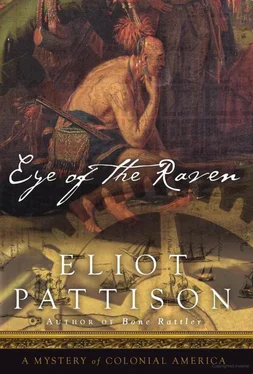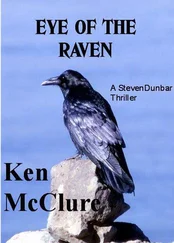Eliot Pattison - Eye of the Raven
Здесь есть возможность читать онлайн «Eliot Pattison - Eye of the Raven» весь текст электронной книги совершенно бесплатно (целиком полную версию без сокращений). В некоторых случаях можно слушать аудио, скачать через торрент в формате fb2 и присутствует краткое содержание. Год выпуска: 2010, ISBN: 2010, Издательство: Counterpoint Press, Жанр: Исторический детектив, на английском языке. Описание произведения, (предисловие) а так же отзывы посетителей доступны на портале библиотеки ЛибКат.
- Название:Eye of the Raven
- Автор:
- Издательство:Counterpoint Press
- Жанр:
- Год:2010
- ISBN:9781582437019
- Рейтинг книги:5 / 5. Голосов: 1
-
Избранное:Добавить в избранное
- Отзывы:
-
Ваша оценка:
- 100
- 1
- 2
- 3
- 4
- 5
Eye of the Raven: краткое содержание, описание и аннотация
Предлагаем к чтению аннотацию, описание, краткое содержание или предисловие (зависит от того, что написал сам автор книги «Eye of the Raven»). Если вы не нашли необходимую информацию о книге — напишите в комментариях, мы постараемся отыскать её.
Eye of the Raven — читать онлайн бесплатно полную книгу (весь текст) целиком
Ниже представлен текст книги, разбитый по страницам. Система сохранения места последней прочитанной страницы, позволяет с удобством читать онлайн бесплатно книгу «Eye of the Raven», без необходимости каждый раз заново искать на чём Вы остановились. Поставьте закладку, и сможете в любой момент перейти на страницу, на которой закончили чтение.
Интервал:
Закладка:
"He was ruined. Some of the priests wanted him burned for a heretic. They did not wait for their bishop to act. He was thrown out of the order that very day."
"But now," Duncan observed, "he works with clocks himself."
"Now," Moses corrected, "he seeks to make the tribes understand that machines are not magic, that we can make them too. He bought a clock from some settler and took it apart for all to see, bought tools to work with it. He has Delaware and Iroquois carvers who make wooden gears, then he shows them how to assemble them. He shows them how such things are but products of their hands, like a good bow or a canoe."
"You're saying," Hadley suggested, "that he wants the Indians to understand they can live without the help of Europeans."
"Just as Africans can have lives without Europeans," Moses added.
Moses' wife finally tried her English. "He … stop the rum," she said. "He stop the guns."
"He runs off the gun and rum traders whenever he finds them here," Moses explained.
"Does he know Skanawati?"
Moses hesitated before responding, his expression troubled.
"Last autumn Skanawati called a gathering of chiefs. He arrived with war paint on. He demanded they eject a natural philosopher from Philadelphia who was-" Moses searched for words, "doing experiments with Indians. I think that's when Rideaux met Skanawati, when they realized they both were striving for the same end, trying to wean the Iroquois off the ways of the Europeans."
"It is why I too try to reach out to him," a new voice broke in. Macklin was standing at the end of the table. "I tell the Frenchman what he and I are doing is not so very different. But he scorns me, asks why our converts wear European clothing, live in European houses, are given European tools. I explain that it is only Christian to provide for their comfort. But he laughs, says his Bible provides for the comfort of souls but says nothing of German forges and British tea. He says all I am doing is forcing them to bite at the forbidden fruit. He said we fail to grasp the miracles of the wilderness. He ejected me the last time I tried to speak with his Indians, months ago. I have seen him do great kindnesses. He has the touch of Saint Francis in communing with animals. But he also can have the touch of the rabid dog. He has perverted our technology to create an abomination in his house, a monster of gears and fur."
"People are being killed along the boundary line," Duncan announced, with clock gears pounded into their hearts."
Moses went very still. He translated in a hoarse voice for his wife. "They will look to Shamokin," he said. Fear was heavy in his words.
His companions had grasped what was at stake faster than Duncan. There seemed little doubt now. If the European settlers knew about the gears in the hearts-word would soon come outand the strange role of gears in Shamokin, they would not wait for soldiers or a magistrate, they would march on Shamokin in their own frantic fear, with guns and torches. Settlements of Indians had been burned for less.
"The first place they will go to is Rideaux's compound," observed Van Grut, who had joined the table. "Word was already spreading through the convoy when we left. Bythe's murder may be the spark that ignites the powder keg."
"Mokie!" Hadley cried out. "Do you have your gun, McCallum?" the Virginian asked.
Duncan looked up. "At the canoes with our gear."
"We must get her out of there."
Duncan had not forgotten Mokie but found himself dreading the prospect of returning to Rideaux's compound. He lingered only long enough to make a quick inquiry of Moses, then led Van Grut and Hadley on a brief detour.
The two-story log cabin that served as a store appeared to be a prosperous establishment, with barrels and crates of goods stacked along its porch. Duncan did not hesitate when he spotted a stout European in an apron sweeping the end of the porch.
"It is a bold thing to be openly supplying runaway slaves," he declared loudly, standing close as the man turned.
The man grabbed the broom like a staff as if to defend himself. "Surely I don't know-"
Duncan seized the broom himself and used it to shove the merchant backward, pressing him against the wall. "I do not seek the slaves, but I will know who is paying for their supplies."
"I am but a clerk, sir. If one of the blacks arrives the proprietor takes them in the back room, gives me a list of supplies to gather." The clerk glanced uneasily at Hadley and Van Grut, who now flanked Duncan.
"Where do we find your proprietor?"
"Mr. Waller's gone, sir. Left for Philadelphia. All of a sudden he said he had to leave, though last night he spoke of how he and I would scrub out the smoke house today."
"Then I'll see his books."
The clerk took a deep breath and glanced in both directions to assure there were no eavesdroppers. "No need, sir. I have taken my own secret looks. There is naught but a credit shown. Runaways, it says, and when the account is low it is replenished from Philadelphia."
"Tell me this," Moses asked. "When exactly did Mr. Waller depart?"
"Not two hours ago."
"Two hours," Van Grut said as they walked away, "was when someone tried to kill you, Duncan."
"Two hours, more precisely," Moses observed, "was when someone failed to kill you."
The faces of their little party were dark as they finally approached the palisade on the ridge, rifles at the ready. Van Grut's eyes were round with wonder as he saw the carousel in the yard. Things were much as Duncan had seen before, with Indians cleaning skins and packing furs, but as the men in the yard saw Duncan they stopped, looking up in surprise, murmuring to each other. Reverend Macklin and Moses appeared out of the brush by the gate to step protectively to Duncan's side. Conawago, though still withdrawn, accompanied them. The Indians, all appearing to be from the minor tribes, seemed to ignore the missionary but nodded uneasily at Moses. The looks the Christian Indian exchanged with them reminded Duncan of the complex relations within the tribes themselves. While the tension between them could simply be that between the baptized and the unconverted, it just as easily could be because Moses was Onondaga and they were of the tribes subjected by the Iroquois.
Rideaux seemed to be expecting them. He led them to his table, where a jug and cups awaited, then held a finger to his lips and pointed to the hearth, where two mounds of black fur again were arrayed in front of the coals. Curled up around them, her head on the back of the young bear, was Mokie, lost in slumber. As Macklin stepped inside the Frenchman hesitated, first fixing the missionary with a cool gaze, then frowning as he turned to Duncan.
"As you can see, there is no need for firearms," Rideaux said in a near whisper.
Van Grut instantly set his fowling piece down, pulled out his sketch pad, and began drawing the sleeping figures.
Duncan did not give up his rifle. "The last time I visited someone tried to kill me."
"The last time you were here I believe you frightened us more than we frightened you."
Duncan returned Rideaux's steady gaze, fighting an impulse to snatch away Mokie and flee from this unpredictable man. But suddenly a gasp of surprise came from Reverend Macklin. He was holding one of the slates Duncan had seen in the larger chamber. "You are devising an Iroquois alphabet?" he asked the Frenchman.
"We use the roman alphabet," he replied with one of his unsettling grins, "just reduce the sounds to letters. So as not to handicap the Europeans."
"We?"
Rideaux opened the door that led to the kitchen, revealing two Indian men busy with quills and paper at a large table, putting Duncan in mind of monks illuminating manuscripts. Moses rushed into the room, greeting the two men as old friends and leaning over the table to examine their work. Conawago looked on.
Читать дальшеИнтервал:
Закладка:
Похожие книги на «Eye of the Raven»
Представляем Вашему вниманию похожие книги на «Eye of the Raven» списком для выбора. Мы отобрали схожую по названию и смыслу литературу в надежде предоставить читателям больше вариантов отыскать новые, интересные, ещё непрочитанные произведения.
Обсуждение, отзывы о книге «Eye of the Raven» и просто собственные мнения читателей. Оставьте ваши комментарии, напишите, что Вы думаете о произведении, его смысле или главных героях. Укажите что конкретно понравилось, а что нет, и почему Вы так считаете.












